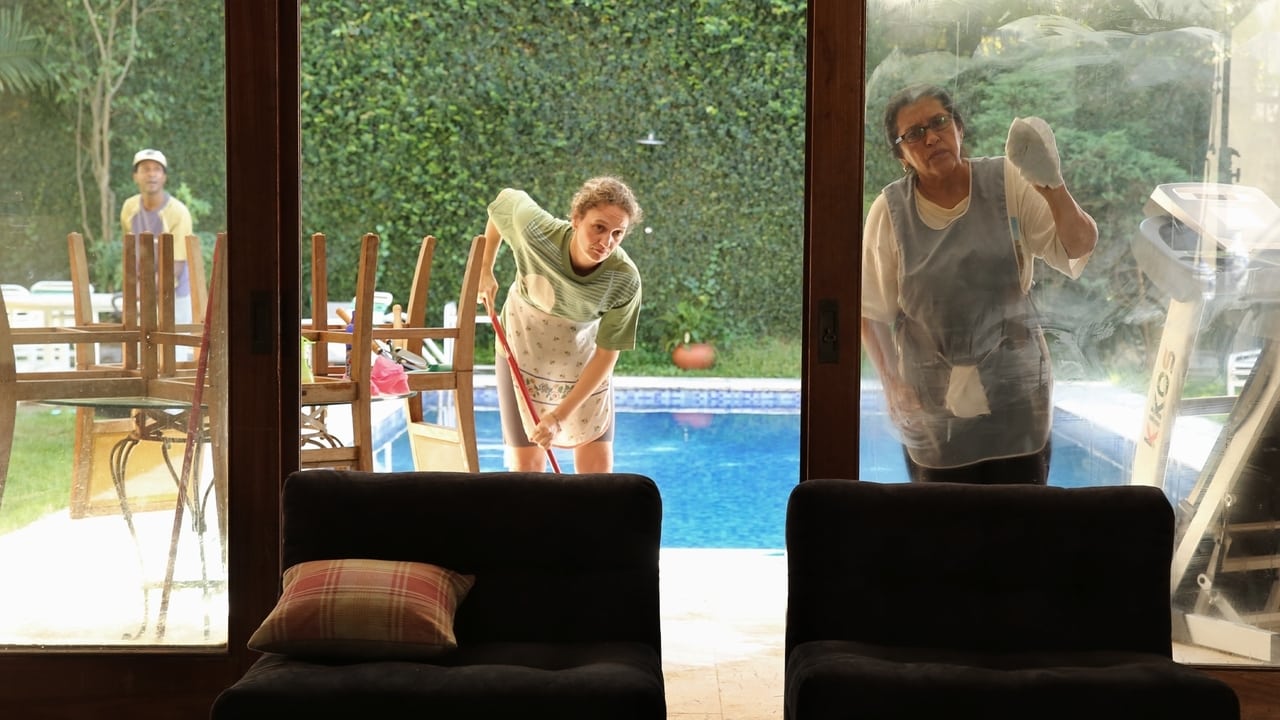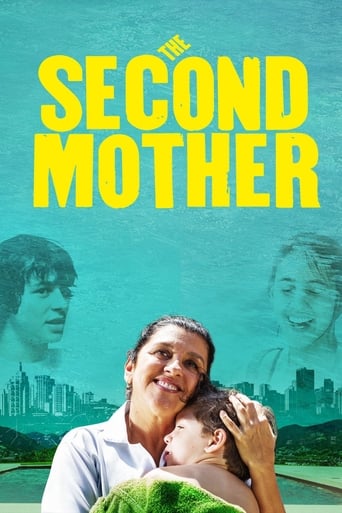Hellen
I like the storyline of this show,it attract me so much
Exoticalot
People are voting emotionally.
Quiet Muffin
This movie tries so hard to be funny, yet it falls flat every time. Just another example of recycled ideas repackaged with women in an attempt to appeal to a certain audience.
Zlatica
One of the worst ways to make a cult movie is to set out to make a cult movie.
anapineapple
The Second Mother is a wonderful film that really emphasizes many topics that we really do not get to cover in other films. Even if we do cover them directly, the audience would feel attacked and would not want to see the film. This film covers these various topics in an indirect way, by making the audience empathize with the protagonist, Val. Through the use of emphasizing the audience would not have to feel attacked and can learn about the wrongs in the film in their own way. The film covers topics such as social class, race, and gender. We see Val in the movie as a nanny, taking care of a child who is rich and comes from a mostly white family. Val, is a woman of color that is also one of the main servants in the family's home. She is shown as "knowing her place", because of her knowing that she poor and is supposed to be in the shadows when serving the family. If one researches the history of Brazil we learn more about slavery in Brazil and the abuse that the slaves went through. One of the many roles the slaves had to got through was to be a servant in the master's house, so we see that in Val's case. There is also the topic of gender and the woman's role in which we see with the patriarch of the family towards the daughter and in Val's case. Val's case was supposed to take care of her daughter, but instead she took care of the family's son and her daughter comes by and reiterates to her what her original role was. There are many more topics that the film covers, such as intergenerational mobility and more. I describe the movie as a serious film, and it is not. It is an enjoyable film with many scenes that made me laugh. I definitely recommend this movie to anyone who wants to wants to know more about Brazil and to pass time. I promise you, it is not boring.
ejhoffman
This movies tells the interesting story of a nanny, Val, and her daughter, Jessica. The two have not seen each other in about ten years, and out of the blue, Jessica calls and is on her way to Sao Paolo to begin applying for university. The rest of the movie is a portrayal of Jessica and Val's rocky relationship over the socioeconomic classes that dictate Val's oppressed behavior. The most confusing part of the story for me is Jessica's aggressive reaction to her mother's position within the family that she is serving. The movie does not go into much details as to where Jessica was raised, but it is hinted that she came from the northeast. Her attitude is almost entitled as if she too is coming from the highest of the socioeconomic class of Brazil. While I disagree with the manner in which Val is treated by the family, there are certain social graces that most people understand regardless of socioeconomic class. Jessica's aggressive behavior causes a lot of tension between her and her mother, and I still do not understand where this is coming from. WE do not know if she is coming from a higher socioeconomic class than her mother. My theory is that she maybe is harboring a little bit of jealousy. Val has more or less been the mother figure to the son of the family, Fabrinho. While Jessica at a young age, had her mother stolen from her, Fabrinho had two. Sort of. Val seems to be kinder and more caring towards this young boy that is not even her own child. As a daughter, that must be hard to watch, and that is why I believe that Jessica is a little aggressive in her behavior at the family's home. The children of the domestic workers are almost getting the short end of the stick. She had to grow up without really knowing her mother, at the same time that her mother was taking care of a child that is not her own.
biridianaescobar
The Second Mother (2015) directed by Anna Muylaert is a fascinating film. I really love that the director focuses on positive aspects of topics that are not normally spoken about positively.This film focuses on the life of the protagonist Val. Val moves to Sao Paulo leaving her daughter behind to provide a better life for her. In Sao Paulo, Val works as a maid for a wealthy family. She lives with this family and takes care of the only child of the family, Fabinho. When Val's daughter, Jessica, is almost eighteen years old, she calls Val asking if she can live with her while she studies to take the admission exam at the University of Sao Paulo. Val asks the family she lives with for permission to let Jessica live with them while they look for an apartment for both of them. The lady of the house, Dona Barbara, gives Val permission. When Jessica arrives at the house of the wealthy family, she is surprised that she expects her to sleep in the tight room where Val stays. Dona Barbara's husband, Don Carlos, is attracted to Jessica. He lets her do what she wants and treats her like a person of the family. Val scolds Jessica a lot and tells her that she should not have social interactions with the family because they are poor.I love Jessica's character and the positive use that the director gave to that character. For example, the director gives a poor person access to one of the best universities in Brazil. On the other hand, a rich boy did not pass the exam to enter that university. I loved this because the director changed the typical stereotype. The director also did this with Jessicas' character by making her self-confident and fighting for her rights.
Red_Identity
It's not everyday that we get a film like this, not willing to really dive into the political, social issues that pervade everyday life, and the cultural barriers and differences that micro- aggressions really make. The acting in this is superb, especially from Regina Case. It's all very natural and in the vein of real life, to an almost unbearably disturbing extent. The screenplay and directing are superb. None of it is at all showy, but it all builds up to quietly powerful, and deeply emotional, moments and scenes. The characterization is rich and it all really sneaks up on you in terms of its effect. definitely recommended, although it's not for those wanting loud or showy extravaganza.

